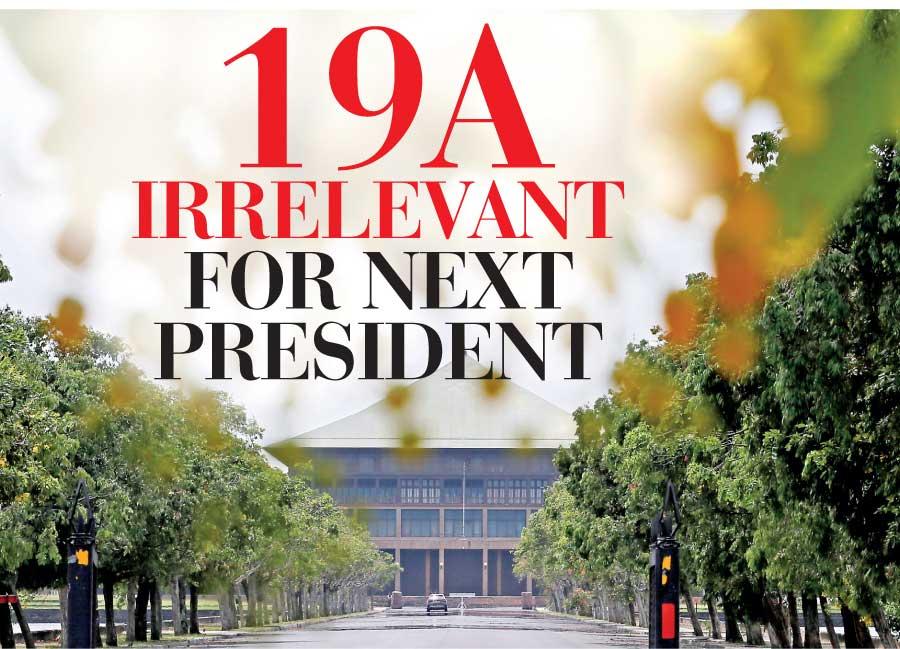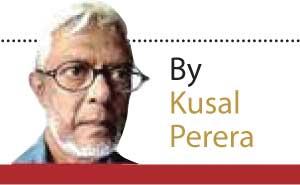Reply To:
Name - Reply Comment

In urban elite circles, there is much debate on 19A and the powers the next elected President would have. 19A goes down in parliamentary history as a set of amendments that had clauses read only in English and a Tamil MP was rudely shouted down by no less a person than the Prime Minister himself for requesting a Tamil translation. What was adopted  nevertheless is now supreme law of the country and defines the power the next elected President would enjoy. The argument goes, the next President elect (i) will not be allowed to hold any portfolio under Article 45. Not even the Defence Ministry; (ii) has no power to dissolve Parliament; (iii) has no power to appoint Cabinet ministers, non-Cabinet and deputy ministers unless in consultation with the PM; (iv) has no power to appoint persons to high posts the Constitutional Council (CC) is held responsible for. It is now said, the next elected President would be as good as a ceremonial Head of State and very much a ‘William Gopallawa.’ There are therefore isolated demands to boycott the presidential election as it is not worth the massive cost the people will have to bear in electing a ceremonial Head of State.
nevertheless is now supreme law of the country and defines the power the next elected President would enjoy. The argument goes, the next President elect (i) will not be allowed to hold any portfolio under Article 45. Not even the Defence Ministry; (ii) has no power to dissolve Parliament; (iii) has no power to appoint Cabinet ministers, non-Cabinet and deputy ministers unless in consultation with the PM; (iv) has no power to appoint persons to high posts the Constitutional Council (CC) is held responsible for. It is now said, the next elected President would be as good as a ceremonial Head of State and very much a ‘William Gopallawa.’ There are therefore isolated demands to boycott the presidential election as it is not worth the massive cost the people will have to bear in electing a ceremonial Head of State.
How valid is that interpretation of the present Constitution with 19A included? In legal and technical terms, yes, that sounds what the next President elect would be. But, Constitutions don’t hold any water, if people don’t stand to safeguard it and for its full implementation. There is also politics in how a Constitution is made valid for the people and how people accept it as supreme law of the country. In post-independent Ceylon and Sri Lanka, none of the Constitutions was made and adopted with people’s participation and with their endorsement. All three Constitutions since independence were violated without any protest by the people.
The first Constitution of independent Ceylon drafted by a Britisher and given to us was therefore called the ‘Soulbury Constitution’ which included Clause 29, exclusively written to safeguard the rights of minority communities and groups. It said; “No law shall make persons of any community or religion liable to disabilities or restrictions to which any person of other communities or religions is not made liable.” It also said it should not “confer on persons or any community or religion any privilege or advantage which is not conferred on persons of other communities or religions.” Yet, violating Clause 29, the first Parliament in its first year adopted the Citizenship Act No.18 of 1948 and the Ceylon Parliamentary Election (Amendment) Act No. 48 of 1949 that together disfranchised and de-citizenised the upcountry Indian Tamil labourers who were then citizens and voted at the first parliamentary elections in 1947.
Two legal interventions were made against these Acts – one in Supreme Court (SC) by Sivanganasunderam and the other by Kodakan Pillai in the Privy Council. The SC ruled there was no intended violation of Clause 29(2) of the Constitution and the Privy Council decided it was normal for Parliament to define the composition of its nationals. Violation of Clause 29 was politically irrelevant in society and there was no demand insisting the government should respect and act within the Constitution.
It was no different when the Bandaranaike Government in 1956 adopted the Official Languages Act that made Sinhala the only official language. It was challenged by a clerk in government service, Kodeeswaran, whose annual increment was withheld for not gaining ‘Sinhala Proficiency.’Colombo District Court Judge O.L. de Krester upheld Kodeeswaran’s plea and ruled the Official Languages Act contravened Clause 29(2) of the Constitution.
"Results of the presidential election would immediately shatter the equilibrium in Parliament that anyway stands to be dissolved in less than three months by February 2020"
The government appealed to the Supreme Court, which overturned Kodeeswaran’s plea on a very technical issue; a public servant cannot sue the State on employment contracts. Kodeeswaran appealed to the Privy Council, the apex body under the Soulbury Constitution. After many years, the Privy Council directed the SC in 1969 to rule on the constitutional question which it had not considered when overturning Kodeeswaran’s plea. Mrs. Bandaranaike’s coalition government in 1970 abolished appeals to the Privy Council by enacting Act No.44 of 1971 and that closed Kodeeswaran’s case without a final ruling. What is most important is that the constitutionality of the Official Languages Act never became a political debate in society. Constitutions can go violated when people don’t have any interest.
The first Republican Constitution of 1972 had an extremely-short lifespan of six years that ignored the very presence of different ethno-religious identities in society. It had no Constitutional guarantee with all citizens taken as equal citizens of Sri Lanka, in a Constitution that was drafted and adopted with no Tamil MPs participating and voting for it. The very birth of that Constitution was thus a violation of the Tamil people’s fundamental right to be part of creating a Constitution they can also have an ownership.
The second Republican Constitution of 1978, that changed the landscape of the governing structure with the introduction of an executive presidency not decided by the people, has been openly violated with none taking any offence. Fundamental right under Article 14(i)(d) that guarantees the right to form and join a trade union is being openly violated by BOI-SL through numerous administrative regulations and with high-handed employers denying that right to over 400,000 employees both within the 14 industrial zones and outside them. Even in legal fora, the Constitutional right to form trade unions and the right to become a member of a trade union are not taken seriously. Thus, violation of Article 14(i)(d) is one taken for granted.
So is the right to ‘equality.’ The Constitution in Article 12(2) says; “No citizen shall be discriminated against on the grounds of race, religion, language, caste, sex, political opinion, place of birth or any one of such grounds.” But can Muslim people whose properties, houses and businesses were vandalised in post Easter Sunday violence claim their right to be treated as equals was guaranteed by the government and the State? Can that be said about Dr. Shafi? People neither take them as violations of the Constitution nor do governments and political parties.
‘Sovereignty’ of the people is no more important to themselves. Constitution guarantees sovereignty in Chapter I under Article 3; “In the Republic of Sri Lanka, sovereignty is in the people and is ‘inalienable.’ Sovereignty includes the powers of government, fundamental rights and the franchise.” In a country where sovereignty is inalienable and includes the franchise, people’s right to elect their representatives to Provincial Councils has been suppressed for many years. Yet, that goes violated as people don’t stand for their ‘sovereign’ right.
The next presidential elect comes with the polar opposite of this careless and irresponsible social trend. It has already gained damaging political hyper tones very much different to the past. In all previous presidential elections except with Chandrika Kumaratunga in 1994, all other candidates played for the Sinhala vote on Sinhala sentiments. Sirisena’s candidature was focused on ousting Rajapaksa, but soft-peddled on post-war issues. This presidential election is all about Sinhala Buddhist dominance with ‘national security’ hyped by all candidates in their own Sinhala Buddhist lingo. The next elected President therefore comes on a new wave of Sinhala Buddhist dominance that would not care a tuppence for the technicalities of the Constitution.
"All three Constitutions since independence were violated without any protest by the people"
The totality of Sinhala Buddhist extremism would immediately start demanding what they believe they should have as ‘rightful’ owners of the country, irrespective of what the Constitution says. It would be so furious that it may even forget Mahinda Rajapaksa created the ground for this Sinhala Buddhist comeback. Hardline Sinhala Buddhist campaigners would leave Mahinda Rajapaksa to rally behind their own winning candidate. That would be the “popular force” the next President would use to circumvent any Constitutional provision he would want to and the judiciary would not ignore. Even in India where the judiciary has a long tradition as independent and apolitical, the new wave of Hindutva power post Modi’s return as PM, is turning it into a politically-manipulated State agency and is no more clean. Even in the best of times when the judiciary was accepted as independent and free of politics, violations of the Soulbury Constitution could not be legally-proved in the absence of popular social support.
Results of the presidential election would immediately shatter the equilibrium in Parliament that anyway stands to be dissolved in less than three months by February 2020. Most sitting MPs would pledge their support to the new President and constitutional provisions would hardly be important except when they are of advantage. The new President could therefore go for constitutional amendments to repeal 19A and have his hand strengthened once again, if he wants to. The issue therefore is not about electing a William Gopallawa but about electing a President who could once again be a ‘powerful’ executive.
Even without amendments, the present 19A allows the President to appoint all ministry secretaries. What if the next President appoints his own men, ex-servicemen or otherwise as ministry secretaries who would work with the President and reduce Cabinet ministers to mere privileged personalities? The Cabinet headed by the President, the next elect would not be another William Gopallawa for sure. Constitutional provisions don’t come into effect without politics and people’s interventions. Thus, 19A will be irrelevant for the next Sinhala Buddhist President all mainstream political alliances are competing for.